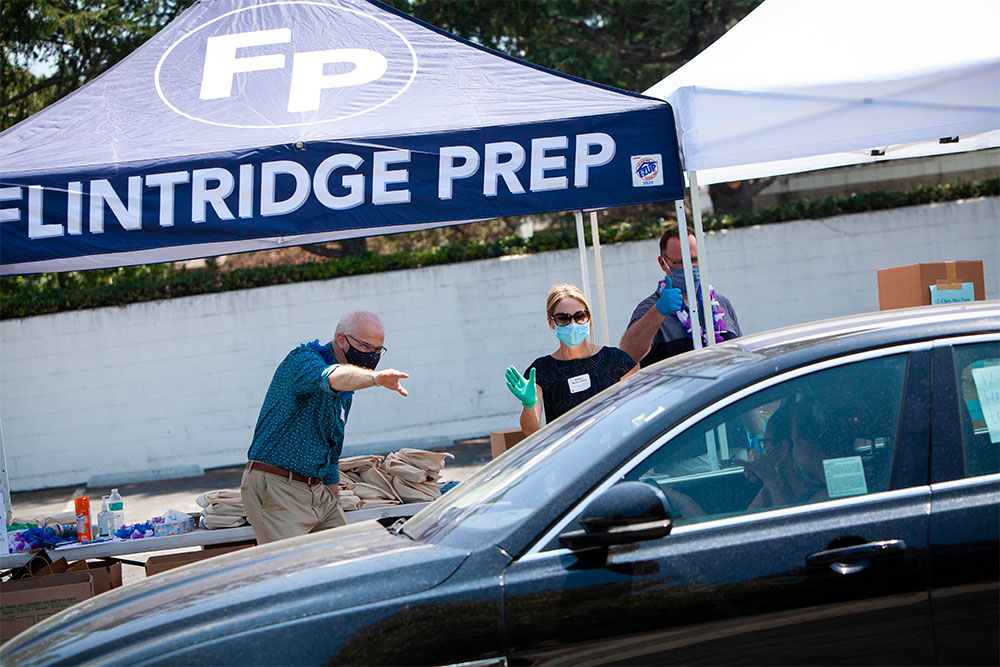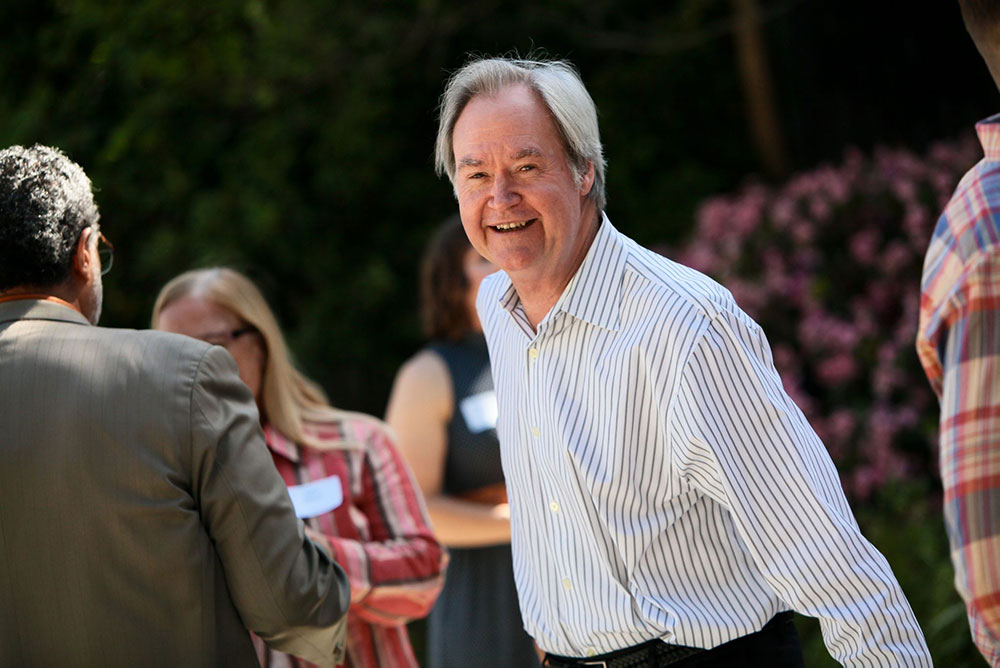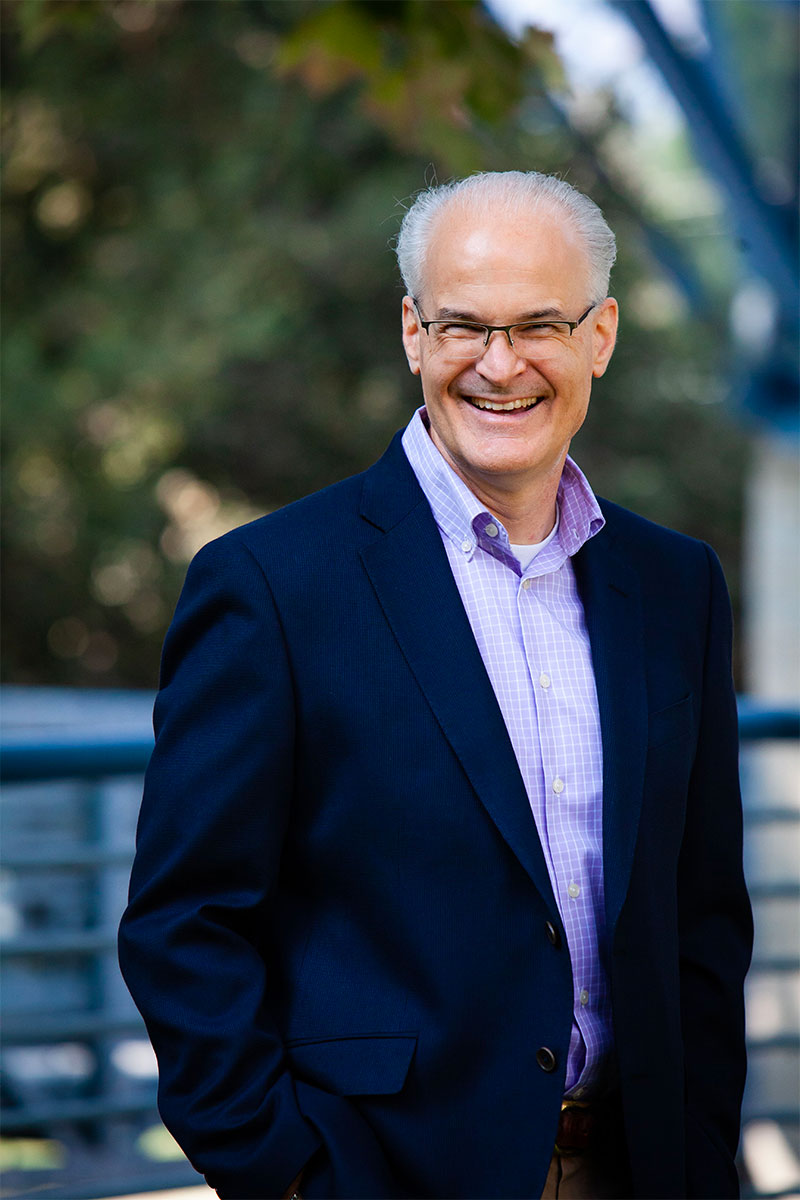Planning for the Future, Prep’s Leadership Team Faces the Unexpected with Strength
With any leadership transition, establishing a team of experienced individuals who provide insider knowledge and a continuity of values helps create a solid foundation for the new leader, whether a company CEO or head of school. This is especially true at Prep, where planning for the transition of leadership has been underway for several years.
Providing this foundation was the primary goal of the Board of Trustees Search and Transition Committee, led by Board Chair Kris Leslie and Head Emeritus Peter Bachmann, when Jim Pickett was named the new head of school last fall. Gathering a team of dedicated, passionate, and collaborative campus leaders was paramount. With a mixture of familiar faces, some with new roles, the leadership team has formed a sounding board that Pickett can count on for support and insight.
Encompassing all aspects of Prep, from academic, extracurricular, and financial, the new leadership team includes:
- Head of School Jim Pickett
- Assistant Head for Academic Life Sarah Cooper
- Assistant Head for Student Life Vanessa Walker-Oakes
- Director of External Affairs Lakshmi Dastur-Johnson
- Director of Finance Theresa King
- Director of Admissions Art Stetson
- Executive Assistant to the Head of School Dr. Megan Hutaff, who joins the school this year.
The decision to have two assistant heads oversee the two most important aspects of a Prep education—the academic life and the student life—spoke to the essential mission of Prep to nurture the whole student, intellectually and emotionally.
“This administrative structure was established to sustain the school into a new era,” Sarah Cooper says. “We have a highly experienced administrative team to help carry out the vision of the school and the new head. We all have years of commitment to Prep and we’re also forward-looking with the professional growth that our faculty, staff, and administrators engage in continually.”
Though Pickett may have been new to Prep life and culture, he is not new to school leadership. While at Castilleja School in Palo Alto, Pickett was the head of upper school for eight years, overseeing the upper school’s operations and guiding major initiatives.
He also spent 13 years at the Cranbrook Schools in Michigan where he taught, supervised a dorm, and served in a variety of roles, including assistant director of schools technology and dean of faculty.
He worked with Bachmann throughout the last school year and got to know the team behind the scenes. Beginning in November 2019, Pickett was consulted on the planning of administrative changes. After his official arrival on July 1, he dove straight in with a leadership retreat in his first week on the job. Working with a group of people who have collaborated with each other for years has provided him with instantaneous access to Prep’s mission and culture.
Pickett’s leadership style is rooted in collaboration and open conversation, and he sees himself as a “quirkily entrepreneurial” motivator who understands when to lead and direct and when to sit back and listen. Rather than enter a conversation by stating all his ideas and answers first, Pickett attempts to get a 360-degree perspective from the assembled team around him.
“Philosophically, I see myself as a co-collaborator, but of course there are times when you need to set a clear course of action and direct people to follow that path. Even when the work is hard, you have to be able to motivate everyone to move together,” says Pickett.
“There are several priorities before us, and chief among them is safely returning our students to campus. The leadership team brings together all this rich cultural knowledge and institutional memory. So much of what we’re facing is unprecedented, and unexpected, but we bring our previous experiences to the table and we tackle the challenges as they come.”
As COVID-19 evolved into a global pandemic, and Bachmann’s tenure neared its conclusion, the school had to pivot quickly, directing focus and resources to the most essential tasks of supporting the health and safety of our community, offering financial assistance to families impacted by the pandemic, and providing our students and families with the best Prep experience possible.
“As it became clear that this was an extended crisis, I worked with Peter, Sarah, Vanessa, and others to address the needs of our students, teachers, and parents,” says Pickett. “To me what was so enlightening about these early conversations was that they confirmed the impression of Prep I gained through the hiring process. Prep is all about relationships, and these relationships stand the tests and storms and challenges that come our way because the people at the center work together so well.”

Cooper, Walker-Oakes Lead Together to Create Connection, Inside and Outside the Classroom
In their roles as academic administrators over the past few years and in transitioning to their new positions,
Assistant Head for Academic Life Sarah Cooper and Assistant Head for Student Life Vanessa Walker-Oakes have been guided by a two-part question: “How are we focusing on the most essential parts of our curriculum, and how are we supporting our curriculum with the social and emotional skills we need at this time?”
“The structure of two assistant heads is a very strong structure, because Vanessa and I both have a lot of experience in what we’re working in and we work very well together,” Cooper explains. “There are some responsibilities that are very distinctly hers or mine, but there are so many topics that overlap and it’s nice to have that strength of structure to be able to address them and to support each other.”
“Having two assistant heads is important to how we create curriculum and student experience, but also essential to the life of the school,” adds Pickett. “But this isn’t merely a structural change. Sarah and Vanessa as individuals are uniquely talented in their roles, and together they provide profound insights about the student and faculty experience that are essential to the school’s success in the past, present, and future.”
As Assistant Head for Academic Life, Cooper oversees faculty and curriculum, including the STEAM and Global Studies initiatives. As the Assistant Head for Student Life, Walker-Oakes oversees all extracurricular, advisory, counseling, student support programs, outdoor education, athletics, college counseling, and the Leadership initiative.
Cooper and Walker-Oakes lead two respective committees, the Academic Life Committee and the Student Life Committee, which include department chairs and administrators (see full list in sidebar). Both Cooper and Walker-Oakes are part of each other’s committees, and Pickett will also attend both committee meetings depending on their agendas.
By sitting on each other’s committees, the two preach what Prep already practices: what students learn inside and outside the classroom must work in concert with one another, with faculty nurturing the connection between the two.
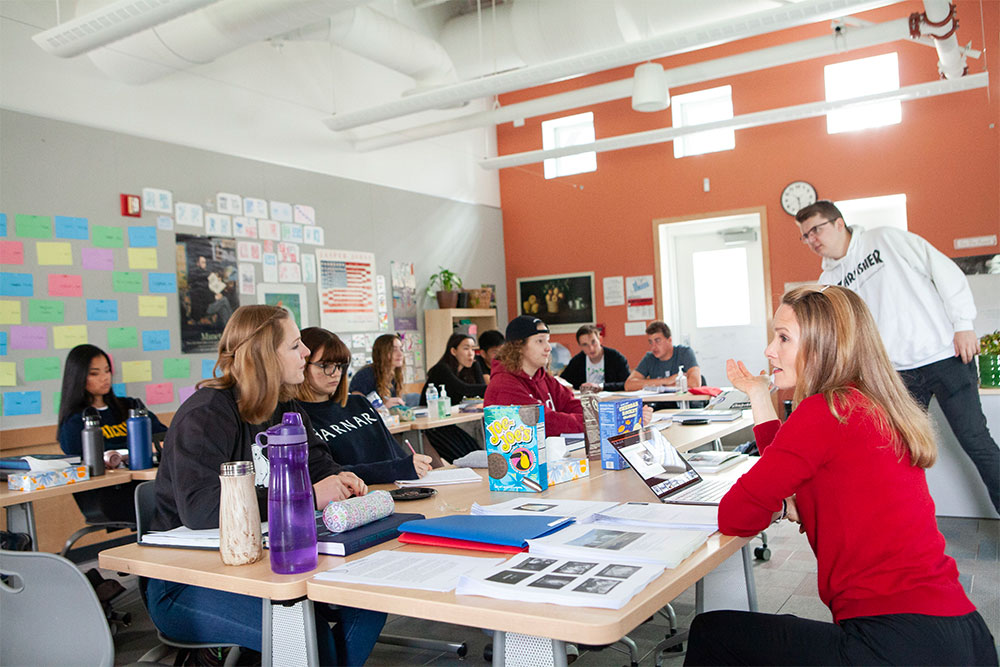
Cooper and Walker-Oakes share similar goals in their new positions and in how they foster a growth-mindset in Prep’s learning environment, incorporate diversity, equity, and inclusion (DEI) and social and emotional learning (SEL) into all aspects of academic and student life, successfully navigate the logistics of educating students during a pandemic, and support the relationships and connections of our students, teachers, and families.
This is not new work. Faculty—including Cooper and Walker-Oakes—participate in an impressive amount of professional growth every year. Last year more than half of the faculty attended conferences, webinars, and trainings in areas ranging from subject matter and curriculum to SEL, student life, DEI, brain development, global studies, leadership, and online learning.
“The Prep community is still the Prep community, whether we’re online or in person,” Cooper says. “The intellectual rigor and commitment of our teachers and our students do not change because we’re online.” But, again, structure and intentionality have allowed the school to maximize impact. A new schedule was created for the 2020–2021 year that includes a late start on Fridays, providing a much-needed break for students. The late start also allows for faculty support through weekly faculty meetings. Teachers can check in with each other, receive training on a variety of topics including DEI and online learning, participate in breakout group discussions about coursework, and attend department meetings.
As Walker-Oakes points out, developing a more dynamic and interdisciplinary Student Life program that aligns with the academics at Prep is living out the school’s philosophy of nurturing the whole student.
“The full scope of the mission of Prep is everyone’s responsibility. We all are responsible to ensure the execution of Prep’s vision and goals in all aspects of the student experience,” she says. “Diversity, equity, and inclusion are at the core of social and emotional learning. Cultural awareness, cultural responsiveness, there’s no way of doing SEL
work well without acknowledging everyone’s full identity and making that seen and heard. I don’t see these two priorities, DEI and SEL, truly working to better our community and the student experience without being interwoven,” Walker-Oakes says.
“Sarah and Vanessa are my partners.” Pickett says, “Ensuring the emotional and intellectual wellbeing of our community, navigating the essential diversity, equity, and inclusion work at hand, this is all so important. I could not be more grateful to work with both of them.” (Read more about the initial framework of Prep’s DEI Board Committee here.)
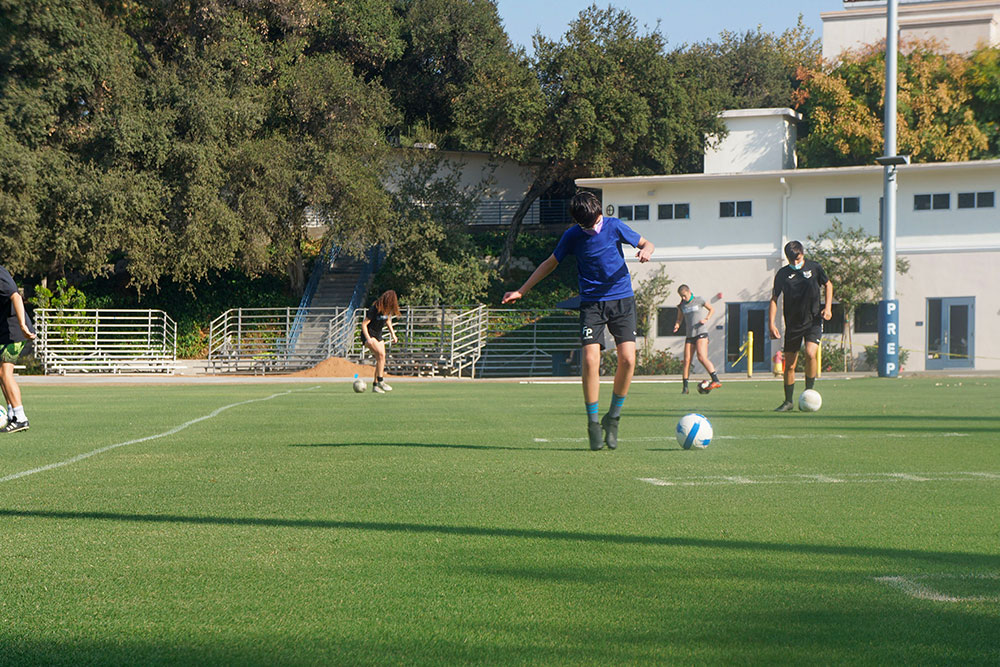
Keeping a Balance for Teachers and Students
With an unprecedented pandemic, social unrest, and racial trauma, 2020 has been a year of challenges for the country and the world. In its fall issue, the National Association of Independent Schools’ Independent School magazine wrote that school leaders must be asking themselves these questions right now:
“How can everyone—administrators, faculty, students, parents—fulfill their respective roles in the educational process while they are themselves navigating such tremendous upheaval? How can the educational process itself foster the development of the skills and resilience needed to actively and intentionally participate in this still-unfolding transformation? Fast-paced social changes mean both tremendous turmoil and tremendous opportunity—how can we maximize the latter while we are acutely aware of the former?”
Over the past few months, our community has come together with an openness, meeting and addressing these challenges with determination, care, and, most importantly, compassion. The school reached out to students, faculty, and parents to gather feedback on the spring semester to make adjustments for the 2020–2021 school year.
Regardless of the learning circumstances, the six takeaways, which became guideposts for each teacher, speak to an emphasis on individual and collective wellbeing:
- Build community
- Be interactive
- Plan for variety in classroom activities
- Encourage student-to-student contact through projects
- Be aware of screen time, and give students a chance to move around and take breaks
- Assign only what’s crucial, and keep in mind that students still have full lives.
Department chairs and other administrators have worked together over the summer and fall semester to ensure that faculty are taking care of themselves and routinely checking in on their students. The relationships built between the students and teachers—and among the teachers—have created spaces of safety, comfort, reflection, and yes, sometimes venting.
Cooper’s focus is to challenge faculty to engage their students in every way possible and to support faculty in this effort. “Whether that’s in the form of a project that sparks a passion that students didn’t know they had, through a class discussion that builds courage in expressing ideas, or by using the deep content knowledge that our faculty have to inspire students to find their own depths in whatever they want to study and commit to, it’s my goal to assist with any of this,” she explains.
This year’s overarching goal for the Student Life Committee is to foster relationships and connection. As Walker-Oakes describes it, “how do we build, nurture, and sustain relationships and connection in an online environment in the short term, and in the longer term, how do we really grow and integrate that commitment across Prep?”
“We’re thinking about ways to reach out to each and every student, through our peer counselors, 8th grade buddies, deans, and advisers, to make sure our students feel connected,” Walker-Oakes shares. “Our faculty are working to create space to check in with students about their social and emotional wellness, even within the context of an academic class. In our faculty meetings, we’ve continually talked about how important it is to take those first five or seven minutes of class to check in with students and ask where they are emotionally.
“Gathering feedback from faculty and students to ensure the efficacy of the measures we are taking to promote student wellbeing is imperative to developing a successful, SEL-informed program,” Walker-Oakes says. “Recently, in addition to gathering feedback from student organizations and individual class surveys, the student life team invited all Prep students to respond to a schoolwide survey evaluating their experience with online learning and homework. The data was then used to implement changes to Prep’s homework policies this fall. Keeping the channels of communication open between students, faculty, and administrators ensures Prep can continue to adapt and iterate its program as we navigate new situations.”
For some teachers, the shift to online learning meant finding creative ways to move away from the screen and nurture environments of comfort for their students. Dr. Genevieve Morgan had her English students listen to a podcast she recorded about haiku, encouraging them to listen and (safely) take a walk outside. Jodie Hare, also in the English Department, revised her essential oils cleansing that she does regularly at the beginning of class with Mindful Monday and Thoughtful Tuesday rituals. Cooper remembers hearing Mark Salzman play cello in the lobby of the new Bachmann Collaboration Building this summer, and the peace and hope it brought her.
Performing Arts teacher Jen Bascom, who taught new students over the summer in her improv and sketch comedy classes, wants to make students laugh and be present. “I want to create a playful and social mindset, to get them to laugh, do physical work like warmups and games and a lot of meditation work,” Bascom says. Bascom declared in the fall that she would make the semester fun no matter what, and as we go to press, the virtual Fall Play “Most Likely To: The Senior Superlative Monologues” is being finalized.
Spanish teacher Cari Banning says, “During the spring, we had already built a relationship of trust, so it made it much easier to keep the lines of communication open and for students to be honest with me. Teaching a language is incredibly dependent on relationships of trust between me and the students and the students with each other.”
Whether her students are brand new or returning, Banning is building relationships online. “I am really rethinking how I present my curriculum and how I get them to interact,” she shares, adding that she thoughtfully creates small groups so students have supportive partners who help each other excel.
“One of the things I appreciate about the Prep community already is the attitude we bring to everything we do,” says Pickett. “You can call it a growth mindset, or a ‘yes, and’ approach—the terms don’t matter as much as the effect. The outcomes we expect of our students—that they be curious, entrepreneurial, and willing to listen and explore ideas they hadn’t considered before—are modeled by our parents first, and then by our faculty, staff, and administration. We’re flexible and responsive, empathic and compassionate. This is the best combination of skills for our community at any time, particularly right now.”
Academic Life and Student Life Committees
The Academic Life Committee, which was previously known as Academic Affairs, encompasses all curricular and faculty work, the eight departments, the Global Studies and STEAM initiatives, faculty professional growth, and school accreditation. Led by Cooper, the team includes eight department chairs, Walker-Oakes, and veteran campus leaders in new roles, including Director of College Counseling Brooke Yoshino, Dean of Students Barrett Jamison, and Assistant Curricular Coordinator and Physics teacher Reid Fritz.
The Student Life Committee is led by Walker-Oakes and focuses on advising, counseling programs, human development and outdoor education programs, athletics, clubs and student organizations, extracurricular arts programs, community service, mentoring, and student leadership. The committee includes Jamison, Associate Dean of Student Support Midge Kimble, Yoshino, Athletic Director Sean Beattie, Performing Arts Chair Molly Mattei, and Cooper.

